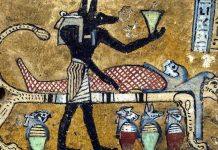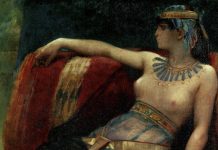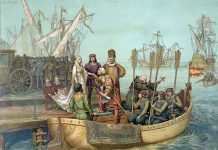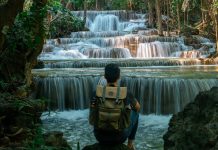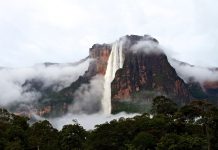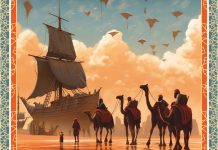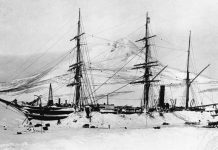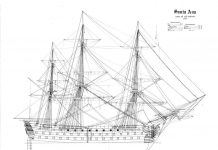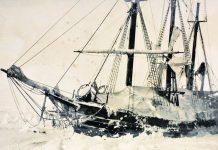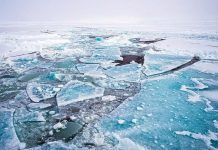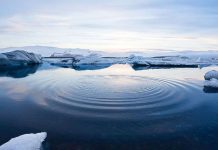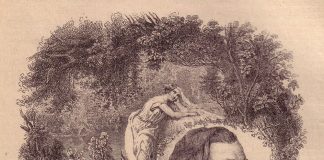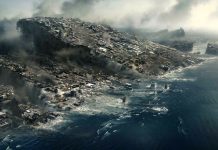This dramatic story began in the summer of 1743, when merchant Yeremey Okladnikov from the city of Mezen, Arkhangelsk province, equipped a sailing and rowing vessel with a crew of 14 pomors for catching sea and fur animals. It went to Svalbard, the Pomors were going to hunt on one of the large islands of the archipelago, where in previous years they had already built a winter quarters.
The first eight days of the voyage proceeded without problems, but on the ninth day a hurricane wind rose, which carried the Pomor vessel to the east, to one of the islands of eastern Svalbard, which the fishermen called Little Brun, and the foreigners called Edge Island. The ship was trapped in an ice trap in a very dangerous position, the ice squeezed the hull of the vessel and could well crush it. It was decided, just in case, to land on the shore, where, according to the helmsman Alexei Himkov (according to a number of sources — Inkov), there should have been a hut built earlier by artisans from the Mezen.
The Pomors decided to send four people ashore to find a winter quarters, ventilate and heat it, preparing it for the reception of the main group. 47-year-old Alexey Himkov, 23-year-old Ivan Himikov, 35-year-old Stepan Sharapov and 30-year-old Fyodor Verigin went ashore.
Early in the morning they went to the ship to help their comrades transport weapons, food and equipment from the ship to the island. However, on the shore, they were horrified to see that the sea was completely clear of ice in front of them, and their ship was nowhere to be found. At night, a hurricane-force wind cracked the ice and carried them away from the shore. The ship was either crushed by the ice, or was carried away to the open sea. As it turned out later, all their comrades were killed.
Four Pomors were left completely alone on a desert island. They had with them a gun, 12 bullets and the same number of charges of gunpowder, an axe, a knife, a small boiler, a piece of tinder and flint, 20 pounds of flour, some smoking tobacco and wooden pipes. It should be noted that there was nothing on the island except stunted vegetation, four Pomors could only dream of Robinson Crusoe’s tropical fruits.
It was clear that there was no reason to hope for salvation in the near future. If their comrades had survived the night storm, their sail would have appeared on the horizon in days or weeks, but this did not happen. It was necessary not to give in to despair, but to prepare for a long life on a desert island in harsh polar conditions.
The discovered hut was quite large and consisted of an entrance hall and an upper room. There was a furnace in it, which was heated in a black way: there was no chimney, and the smoke came out, there was an open door or small windows cut in the walls. Having heated the hut, the windows were tightly closed with boards, the stove gave heat for a long time, it was even possible to sleep on it.
The Pomors carefully cleaned up the hut, carried out the necessary repairs, sealed all the cracks with moss, after that it was time to think about food procurement.
There were practically only 12 shots at the disposal of the Pomors, it was vital that each of the bullets found its target. In order not to miss, the Pomors shot only for sure, for this they had to lie in the cold for hours in an ambush, waiting for the deer to approach the minimum distance. We must pay tribute to the polar Robinsons, all their 12 bullets found their target. However, a polar bear coveted one of the deer and had to share a little with him.
After the bullets and gunpowder ran out, the useless gun was hung on the wall, and the hunt continued with the help of bows, which the Pomors built from branches found on the shore, using deer intestines as a bowstring. The arrowheads were forged from nails that were in a shipboard nailed to the shore. A thick iron hook found in the same board was used as a hammer, and a flat boulder was used as an anvil. It was possible to forge tips for slingshots and even… hooks and harpoons for catching fish! Pomors were used when hunting and various traps made by them.
With the help of slingshots, it was now possible for bears, who, having become impudent, increasingly approached directly to the hut. Of course, without firearms, the hunting process became quite laborious; in order to bring down a deer, it was necessary to shoot several arrows at it, the easiest way was to shoot birds whose feathers were used for feathering arrows. There were a lot of seals and walruses on the island.
The Pomors, though slowly, but confidently harvested meat for the future, they dried it, smoked it, cooked it, salted it (salt was extracted from sea water). Even polar bears became the prey of brave robinsons.
It was necessary to think about the real disaster of the polar latitudes – scurvy. In order not to get sick, the Pomors drank the blood of animals, moved a lot, ate spoonful grass or cochlearia, and fermented it for the winter. Such a diet allowed the Robinsons to resist scurvy, from which, in the polar latitudes, with the availability of food, entire crews of ships often died out, forced to winter in such unsuitable conditions for humans.
During the harsh winter period, of course, one of the main issues was fuel. Trees on the island, of course, did not grow, but on the shore there were many wooden wrecks of ships thrown by waves and even whole trees. All this Pomors collected and harvested for the winter, so the Robinsons managed to provide themselves with fuel. There was no shortage of water, they found a lot of keys on the island, and in winter they simply melted snow in a cauldron.
Loss of a comrade
In many robinsonades, it is often a bigger problem. than getting food, it became psychological atshmusishishsi. yodts often began to hate their partners in misfortune to such an extent that they were even ready to kill them… To the credit of the polar Robinsons, they did not face this problem, each of them tried to do everything for the common good to the best of their abilities. None of them counted other people’s “workdays” and did not consider this or that person useless for their small team.
The Pomors carefully marked the days spent on a desert island so as not to miss religious holidays, they prayed diligently and never blamed God for the trials sent to them. Maybe this was what helped them avoid discord and mutual accusations, which in these conditions were simply deadly.
One of them, Fyodor Verigin, could not overcome his aversion to animal blood, and he was tormented by heartburn and allergies from the herb that saves him from scurvy. Verigin grew weaker every day, suffered cruelly and became completely weak. His comrades could have accused him of being to blame for everything, but they took touching care of him, fed him with a spoon like a small child. Despite all the efforts of friends, Verigin died in the winter of 1748, this death was experienced by all the Robinsons left without a comrade.





